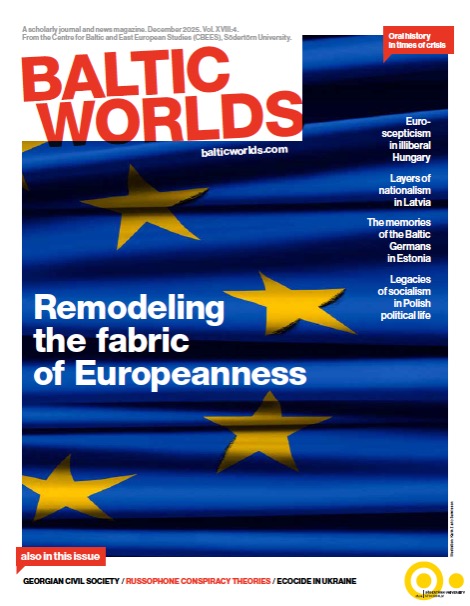The events in Ukraine prompted the countries of East-Central Europe to review their approach to the monuments and collective memory signs that have remained from the Soviet era. Although the region regards the dismantling of Soviet monuments in relation to de-Sovietization that started around 1990, the removal of the remaining Soviet artefacts from public spaces was also related to the international situation in 2013–2014 and 2022, almost thirty years after the collapse of the Soviet Union. As the dominant research of de-Sovietization focus on the elimination of Soviet monuments, i.e. by nature, a negative aspect of de-Sovietization based on the removal and dismantling of monuments, the article presents the concept of positive de-Sovietization based on the case analysis of Lithuanian monuments. The de-Sovietization process is considered dual: the removal of Soviet monuments is accompanied by the construction of the new ones establishing a new historical narrative and state’s identity. It can be defined as a positive aspect of de-Sovietization that makes its implementation complete.
By
Viktorija Rimaitė-Beržiūnienė
September 23, 2025
On March 11, 2025, Lithuania commemorated the 35th anniversary of the restoration of its independence. On that historic day, it became the first republic to break away from the Soviet Union. Already in 1990, it pledged commitment to democracy, international law and human rights. In 1992, these principles were enshrined in its Constitution. An important indicator of a country’s commitment to democratic values is its respect for minority rights, including the rights of sexual and gender minorities.
In 2016, I published an essay in this journal on the occasion of the third Baltic Pride held in Lithuania’s capital, Vilnius. The aim of the essay was to discuss developments in the area of LGBTQ+ (lesbian, gay, bisexual, transsexual, queer/questioning and others) rights after Lithuania’s accession to the European Union (EU) in 2004.
Yet, as this article demonstrates, despite some progress, the reality for LGBTQ
+ people in Lithuania remains complex and not quite rainbow-like.
By
Ausra Padskocimaite
April 16, 2025
Since 1994 anti-genderism has emerged as a new participant in the discourse on sex education. One of the biggest targets of anti-genderism is public schools, where it is claimed that pupils are being indoctrinated with “gender theory”. Anti-genderism obstructs the implementation of sex education in various countries in Europe. Anti-genderist rhetoric and its interface with sex education has been analyzed up till now either as a right-wing or as a Russian propaganda narrative, only sporadically mentioning their common traits. Applying deductive content analysis, this research examined how sex education is utilized by anti-genderism. Sex education is portrayed as a frontline discipline that holds immense power to either distort or protect “traditional values” and sovereignty. Parents are depicted as powerless against sex education. Insights about approaching sex education and radical positions related to it are addressed in the discussion section.
By
Akvilė Giniotaitė
September 18, 2024
This is a presentation of three original public opinion surveys covering the Baltic states, that were recently released in the public domain. All three surveys have been designed specifically to tap the political culture of Estonia, Latvia and Lithuania, including the Russian-speaking poulation groups and other domestic ethnic minorities.
By
Joakim Ekman
August 7, 2024
Marija Gimbutas: Transnational Biography, Feminist Reception, and the Controversy of Goddess Archaeology, Rasa Navickaitė (Routledge: London, 2022) 244 pages
By
Lelde Luika
April 23, 2024
The material landscape of the Baltic states has dramatically changed with the start of the full-scale Russian invasion of Ukraine: the Ukrainian flag, or its distinctive blue-yellow, has saturated the public space. In places once reserved only for the national flag, the Ukrainian flag flies right next to it. Building facades, windows, and walls serve as new surfaces for the display of the yellow and blue. The periodic, holiday-driven appearance of national flags has given way to the constant show of Ukrainian flags.
Essay by
Kara D. Brown & Aimee Herring
December 11, 2023
Radical right parties (RRPs) have been extensively studied throughout the past two decades. One neglected aspect is the youth organizations (YOs) of RRPs and their transnational networks. This article analyzes the transnational links between the YOs of RRPs in Estonia and Latvia. The article contributes to the literature by arguing for four findings relating to the transnational links between the YOs of RRPs, which provide a window into the future of the parties being analyzed.
By
Pēteris F Timofejevs and Louis John Wierenga
August 23, 2023
Bakom och bortom järnridån. De sovjetiska åren och frigörelsen i Baltikum och Ukraina [Behind the Iron Curtain and Beyond. The Soviet Years and the Emancipation in the Baltics and Ukraine]. Li Bennich Björkman. Stockholm: Appell förlag. 465 pages
By
Kristian Gerner
June 20, 2023
This paper seeks to understand how the Catholic Church manages its involvement in gender politics in Lithuania and exerts power. Lithuania signed the Council of Europe Convention on Preventing and Combating Violence against Women and Domestic Violence (the so-called Istanbul Convention) in 2013 but ratification efforts continue to date. The Convention has become a political “hot potato” and caused ideological confrontations. The Catholic Church is here a political actor, leveraging its influence across multiple levels and cycles of the political decision-making process. NGOs have initiated campaigns in attempt to counter the discourse of oppositional conservative and religious political actors.
By
Augustė Nalivaikė
October 25, 2021
Silvia Kučėnaitė Foti it the author of the book The Nazi’s Granddaughter: How I discovered my Grandfather was a War Criminal. After going through major trauma when discovering her grandfather was not the war hero she heard about but a Nazi collaborator, she started to investigate her grandfather’s past. Considering Jewish sources along with the Lithuanian sources Foti questions the Lithuanian official narrative denying any involvement in the Holocaust.
By
Martina Urbinati
October 25, 2021

 Issue 2025, 4:
Issue 2025, 4:  Baltic Worlds covers; the Baltic Sea Region, Eastern Europe, Russia, CentralAsia, Caucasus and the Balkan area.
Baltic Worlds covers; the Baltic Sea Region, Eastern Europe, Russia, CentralAsia, Caucasus and the Balkan area.